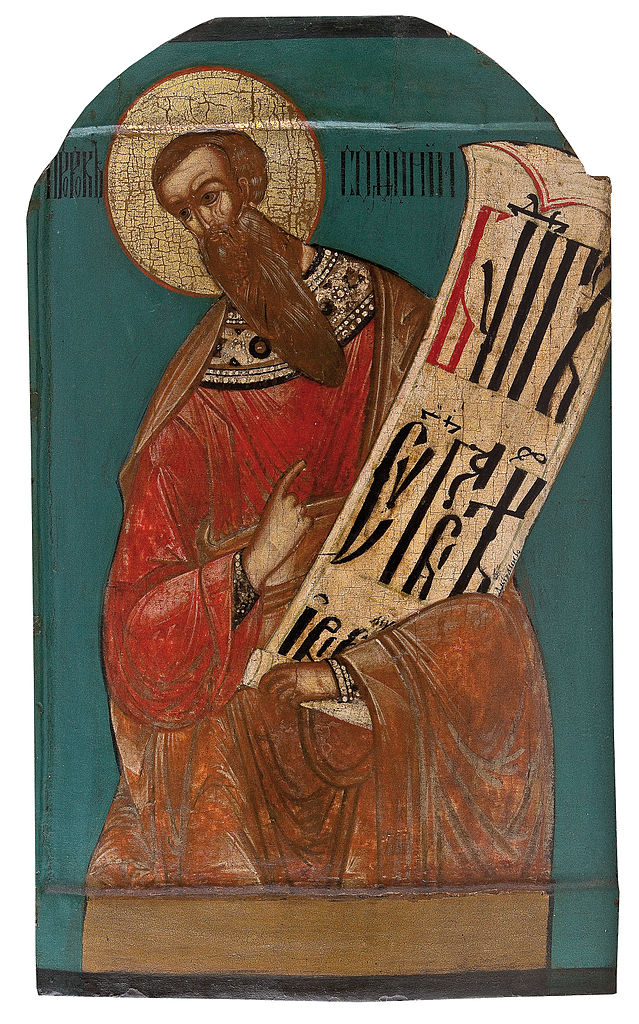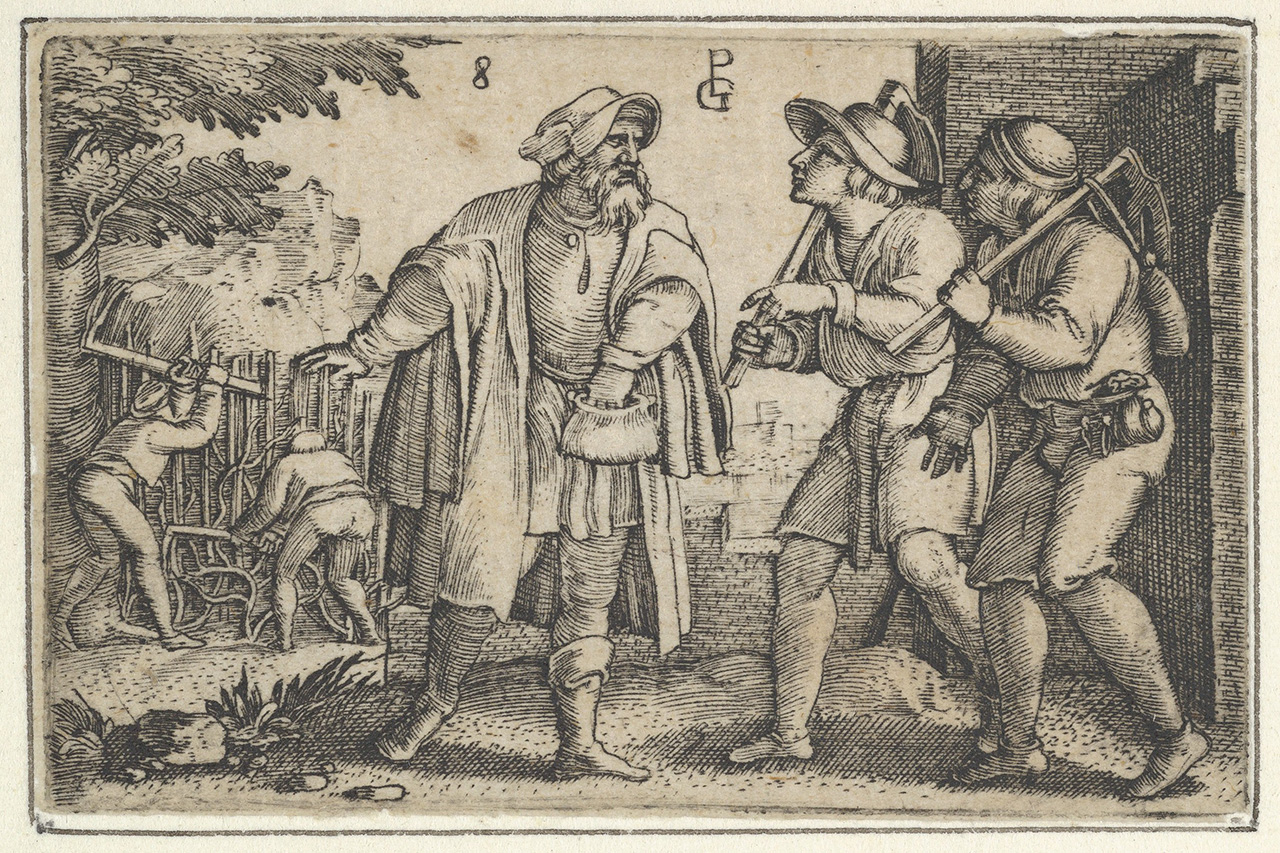Memorial of Saint Lucy, Virgin and Martyr, Third Tuesday of Advent, Year A: Zephaniah 3:1-2, 9-13, Matthew 21:28-32.
Alongside the great promise of our covenant with God – that we will be saved and granted eternal life with Him – there is an ominous warning. If we don’t come to him with open hearts, if we remain committed to our own pleasures and will, then we will be cut off from Him. This being cut off is quite an uncomfortable condition, to put it mildly. Eternal torment is another way to say it. But God would rather have us with Him, so we keep getting warnings to repent, to turn back to him, to stop our navel gazing and do His will while we are alive.
I wonder if we are running out of chances.

Today’s readings give us two of these warnings. The first is given to us through the mouth of the prophet Zephaniah, speaking to the Jews collectively as “Jerusalem.” I think his words could equally be applied to Americans today: “Woe to the city, rebellious and polluted, to the tyrannical city! She hears no voice, accepts no correction; In the LORD she has not trusted.” Especially the idea of accepting no correction – there is a huge arrogance among Americans who feel that this is the best country on the earth and no one can correct us. And don’t get me started on the false slogan “In God we Trust” which makes me cringe every time I see it on a Utah license plate. The main thing our culture trusts in is money; we were built on capitalism and on capitalism we will die. Thus, the great irony is that we were taught to take the “In God we Trust” printed on our currency as a serious statement rather than seeing it for the hoax it was; after all, our government was carefully crafted to fully separate its laws and operations from any religious influence. The truth is, our real slogan is “In Man and Money we Trust.” OK, rant over, but hopefully the applicability of Zephaniah’s words is clear.
Let us pray we are called to participate in Zephaniah’s next statement: “I will change and purify the lips of the peoples, That they all may call upon the name of the LORD.” If we want to join our Lord, we must start by actually being courageous enough to call upon His name, in private and in public. God’s promise is that, like it or not, He will intervene. We will become a changed, humbled people. “You need not be ashamed of all your deeds, your rebellious actions against me; For then will I remove from your midst the proud braggarts, And you shall no longer exalt yourself.” It may be easiest to see our showboating athletes, strutting music icons, and loudmouthed politicians as the “proud braggarts” of our culture, but I know that every time I hope for recognition at work or appreciation at home or even desire for holiness that I participate in this exalting of self. My wife has shared with me the powerful Litany of Humility this Advent, and it is a fantastic prayer to help us get ourselves right around the crucial problem of pride. Thank you to her! I’ve included it here.
Litany of Humility
-by Rafael Cardinal Merry del Val
O Jesus! meek and humble of heart, Hear me.
From the desire of being esteemed,
Deliver me, Jesus.
From the desire of being loved,
Deliver me, Jesus.
From the desire of being extolled,
Deliver me, Jesus.
From the desire of being honored,
Deliver me, Jesus.
From the desire of being praised,
Deliver me, Jesus.
From the desire of being preferred to others,
Deliver me, Jesus.
From the desire of being consulted,
Deliver me, Jesus.
From the desire of being approved,
Deliver me, Jesus.
From the fear of being humiliated,
Deliver me, Jesus.
From the fear of being despised,
Deliver me, Jesus.
From the fear of suffering rebukes,
Deliver me, Jesus.
From the fear of being calumated,
Deliver me, Jesus.
From the fear of being forgotten,
Deliver me, Jesus.
From the fear of being ridiculed,
Deliver me, Jesus.
From the fear of being wronged,
Deliver me, Jesus.
From the fear of being suspected,
Deliver me, Jesus.
That others may be loved more than I,
Jesus, grant me the grace to desire it.
That others may be esteemed more than I,
Jesus, grant me the grace to desire it.
That, in the opinion of the world, others may be loved more than I, others may increase and I may decrease,
Jesus, grant me the grace to desire it.
That others may be chosen and I set aside,
Jesus, grant me the grace to desire it.
That others may be praised and I unnoticed,
Jesus, grant me the grace to desire it.
That others may be preferred to me in everything,
Jesus, grant me the grace to desire it.
That others may become holier than I, provided that I may become as holy as I should,
Jesus, grant me the grace to desire it.
Amen.
Maybe if we pray the Litany of Humility enough and conform our hearts more and more to doing God’s will alone, we can be a part of the remnant that Zephaniah speaks of: “But I will leave as a remnant in your midst a people humble and lowly, Who shall take refuge in the name of the LORD: the remnant of Israel.” We often jump to the idea of exalting in God’s glory in heaven, of living in the bliss of His presence, without considering what type of person we must become first. Heaven as an endless banquet is a wonderful image, heaven as a state of having no cares or worries is as well. But these things look very different for the person who has and expects nothing versus the person who has many things and is continually striving for more. For me, I fall into the problem of seeing heaven as a place of final relaxation with the Lord, essentially where I can be lazy in the sun, like a great beach vacation. How stupid! This vision is completely dominated first of all by me, and secondly by how I will feel. I have so far to go. So far, in fact, that I feel like I’m starting at the beginning every day.
Contrast this vision of heaven with the mindset of someone who is truly humble before the Lord. For someone who thirsts, for someone who never expects to be mentioned in conversations or remembered by history, even a sidelong glance from the Lord is a thrill of a lifetime. Imagine this person being looked upon full in the face by the Lord, in absolute love, and then grasped and pulled to sit at the Master’s table to be in His presence for eternity. This is mind-blowing. This is heaven. And it’s not as if the Lord is awesome as a consequence of perspective. God is truly awesome with or without our perspective being right.
Zephaniah shows us that God’s will is that we be humble. One might claim that only by being truly humble can we experience true love for Him and all others in humanity. Consider this: pride by its nature seeks to put us above others, to see them as an object to be used (as my confessor recently gently explained to me), and there can be no love when this adversarial, objectifying impulse is present. Love is itself desiring the good of the other more than the good for yourself. If you see yourself above others, how can you ever truly love them? You might care for them, have sympathy for them, even do good works for them, but love, caritas, agape, is another mode. For this reason, we should pray to become a remnant of the people, humble and lowly.
Nearly 700 years after Zephaniah and all of the other prophets who repeated God’s message to the people, we encounter Jesus in today’s gospel reading. He teaches the Parable of the Two Sons, one who initially refuses to work for his father, but then actually does it and the other who says he will but never does. Growing up, this parable immediately resonated with me. I was always mouthy (I know, shocking!), but thankfully the conscience God planted in me was also very active. I often regretted things said or done in moments of passion (temper), and sought to do good afterwards, in part to atone for my previous idiocy. So, I related to this parable on a very literal level. Jesus asks, “Which of the two did his father’s will?” and the answer is obvious.
But understanding the parable on this level doesn’t really go far enough. After all, does God want his people to be a bunch of resistant hotheads who end up doing the right thing in the end? Probably not. This parable is illustrating an aspect of hearing God’s will, not an entire way of being a good Christian. The point of this parable might be summarized in the title of this post: hey people, you might be running out of chances to follow God’s will! Jesus drives this home when he says, “When John came to you in the way of righteousness, you did not believe him; but tax collectors and prostitutes did. Yet even when you saw that, you did not later change your minds and believe him.” He could have started with: God sent you centuries of prophets and warnings about being humble, turning to Him, and doing His will. But, graciously, he just holds them to what has happened during their generation. He points to John the Baptist, Elijah in their midst, calling them to repentance and opening themselves to God who has come. The chief priests and elders, while initially saying they would do God’s will given their paths in life, didn’t believe John and do God’s will, making them the second son in the parable. The tax collectors and prostitutes, who had initially said no to God in their life choices, now turned to Him to do His will.

This is compounded by the fact that the priests and elders have seen that John’s baptism has been doing much good and converting people’s hearts back to God. John’s ministry of preparing people for Jesus has been successful; many crowds of disciples are filled with faith, are being healed, and are on their way to the Kingdom. But the priests and elders remain antagonistic, challenging and not believing God who is right in front of them.
Woe to them! They are most definitely not the remnant, humble and lowly.
Let us pray the Litany of Humility this Advent with Suzanne. Let us seek to become the remnant who will be welcomed into the Kingdom when our Savior comes.